Tofu Pad Thai with Peanut Sauce
 Written by Megan
Written by Megan
 Prep Time: 20 Mins
Prep Time: 20 Mins
 Cook Time: 25 Mins
Cook Time: 25 Mins
 Total Time: 45 Mins
Total Time: 45 Mins
 Serves 4-6
Serves 4-6
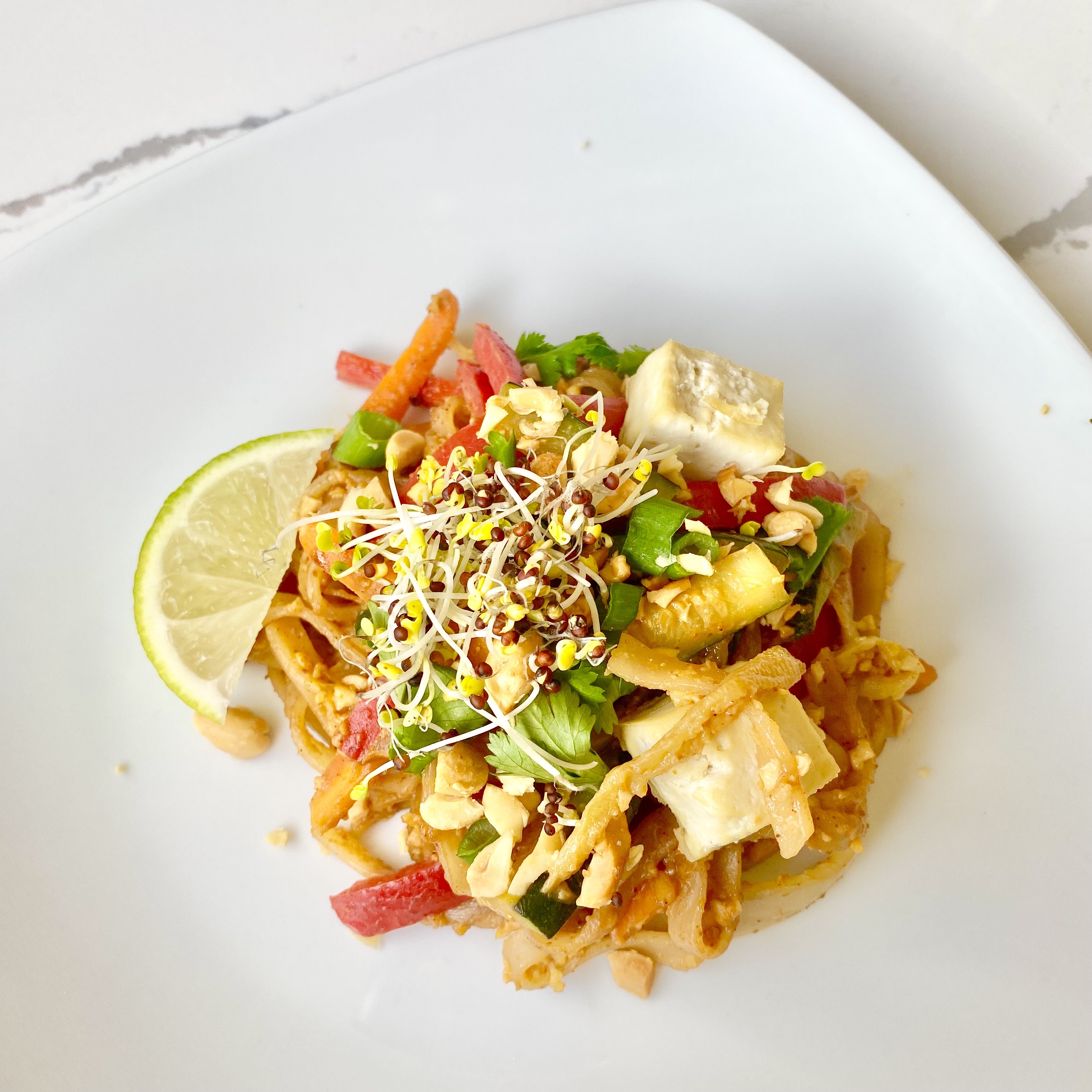
Calling all tofu-lovers, tofu-skeptics, and tofu-haters! In our house I’m the tofu-lover… and you guessed it, Wade is the tofu-skeptic. Or (in his own words) the bean-brick-skeptic.
Regardless of your feelings about tofu (or bean brick), the reality is that this recipe is one of a kind… high in protein, veggies, and flavor!
I like to think of tofu not as a meat substitute, but rather in a different, broader category… the protein category. When people view tofu as a meat substitute, they’re usually disappointed because it’s hard to group tofu in the same category as bacon. When we look at it in a broader group of proteins, we can learn to appreciate the deliciousness of this low-fat, zero-cholesterol, protein-packed, and affordable food!
Another common problem with the way tofu is often viewed is that people expect it to taste good without seasonings. This erroneous assumption leads many people to disregard tofu simply because it did not taste good straight out of the package.
It’s worth noting that raw, unseasoned chicken also doesn’t taste good. Unlike chicken, raw tofu isn’t dangerous, but it does need to be seasoned, cooked, and it usually needs a little bit of oil to get that delicious flavor we all expect.
In this dish, I flavor the tofu with soy sauce because this complements the flavors of the pad thai. I have also chosen to roast the tofu in the oven because this is much simpler than pan frying it (and doesn’t require added oil).
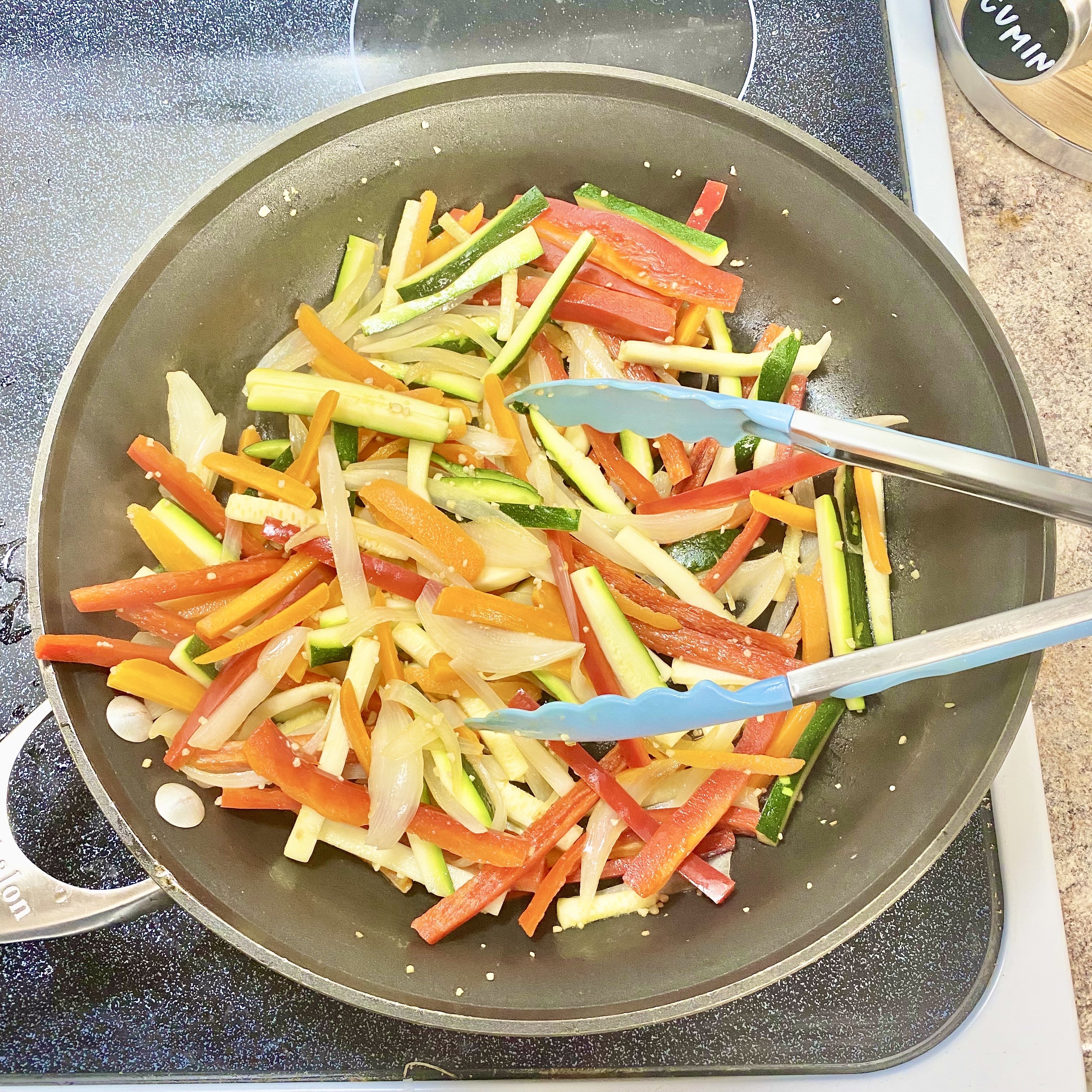
The other amazing thing about this pad thai recipe is how many veggies are packed in! Most pad thai recipes go super heavy on the rice noodles and very light on the veggies. I’ve taken the opposite approach, however. We have julienned carrots, red pepper, and zucchini (plus sliced onions), all of which add delicious flavor, freshness, and so much color!
In addition to the veggies packed into the pad thai, I also like to top this dish with broccoli sprouts. Broccoli sprouts are simply broccoli plants that are only about 3-5 days old. These little plants are packed full of nutrition, and they also taste incredible. I love the fresh, almost earthy flavor that they add to sandwiches, salads, toast, and more.
If the taste alone isn't enough to make you want to eat broccoli sprouts, they are an excellent source of antioxidants that may lower the risk of cancer and reduce inflammation in the body. Are you ready for a bite of that? Let's get started!
WHAT YOU’LL LOVE ABOUT THIS RECIPE
♡ The PEANUT SAUCE: If you’ve made or eaten pad thai before, you will know by now that most pad thai recipes don’t have strong peanut flavor. Most of the peanut flavor comes from chopped peanuts that are sprinkled on top. Amidst my search for a pad thai recipe with an adequate level of peanut flavor, I decided to make my own with a creamy peanut sauce that adds incredible flavor to the dish.
♡ Vegetarian
♡ High PROTEIN content: tofu, scrambled eggs, & peanut butter!
♡ High VEGGIE content!
♡ TOASTED SESAME OIL: This has seriously become one of my favorite additions to Asian-style cooking over the course of this last year. If you’ve never bought toasted sesame oil (or if you’re looking for a new one to try), here’s a link to Whole Food’s toasted sesame oil!
TIPS FOR MAKING THE BEST TOFU PAD THAI
1) GENTLY stir in the tofu: Tofu doesn’t always hold together super well, and while roasting it in the oven will help it hold together better, you should still be very careful when you stir the tofu into the rest of the dish. Gently stir it in so the tofu cubes don’t crumble and break apart. It will still taste great if this does happen, but the dish looks neater and more appetizing when the tofu cubes are all still intact.
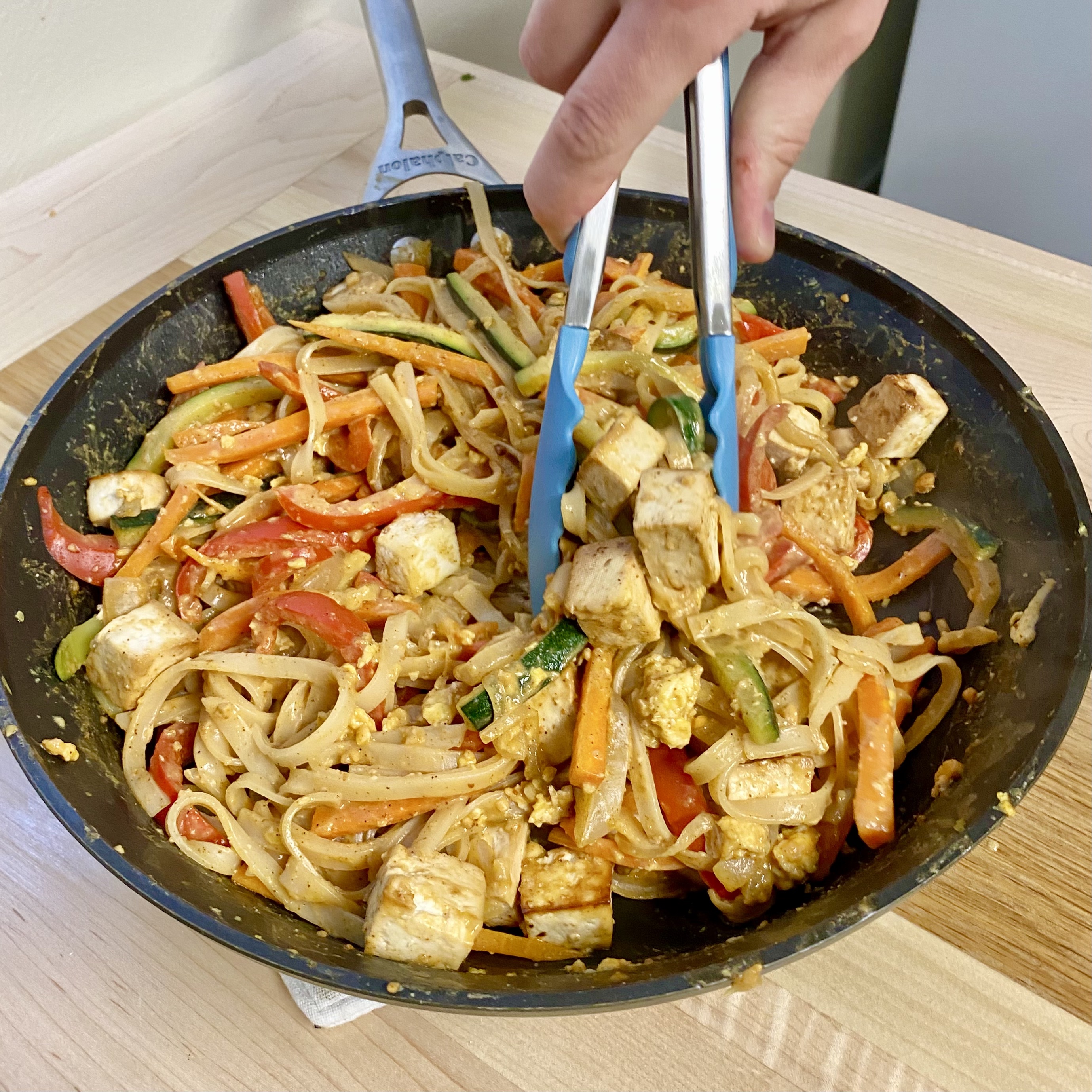
2) TASTE as you go! It can sometimes be tricky to get the perfect level of seasoning in your pad thai. This recipe is the one that I like best, but you may like your pad thai spicier than me! Or you may like it to have more lime! Or salt! Be sure to taste as you go so your finished dish reflects the flavor combos that YOU most love.
SERVING IDEAS
Toppings are absolutely KEY to Pad Thai! In fact, I never eat Pad Thai without cilantro. The cilantro balances out the strong peanut flavor so well, adding much needed freshness. That being said, there are several toppings that I STRONGLY encourage adding to your plate of Pad Thai.
- Cilantro
- Green Onions
- Broccoli Sprouts
- Lime
- Chopped, roasted peanuts
- Extra chili powder / red pepper flakes for added spice!
STORAGE
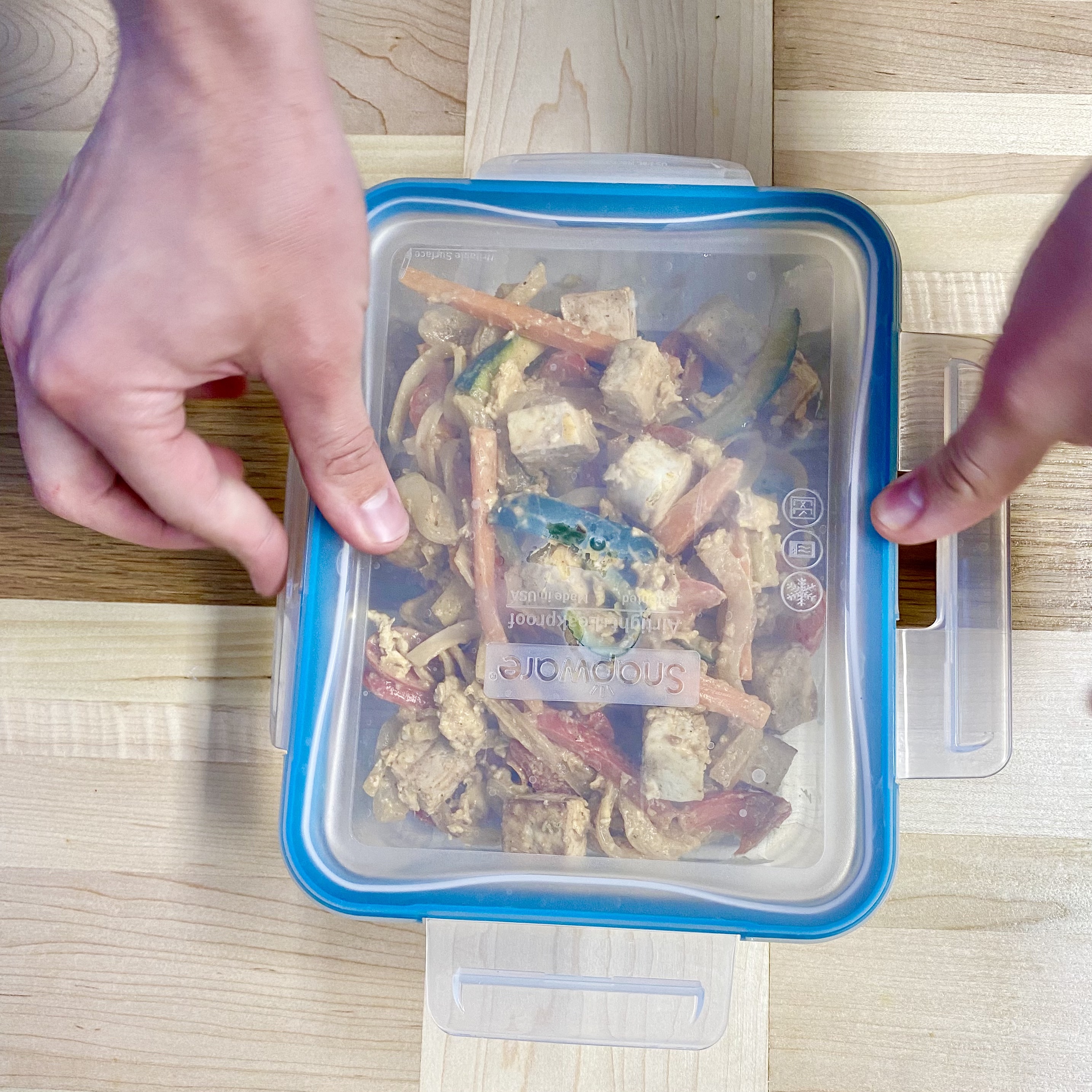
Per the usual, tofu pad thai does store best in an airtight container in the refrigerator!
Tofu pad thai leftovers are SO yummy and heat up really well in the microwave. Don’t forget to add on your toppings after you pull it out of the microwave. If you add the cilantro and broccoli sprouts onto the pad thai before reheating it, the cilantro and broccoli sprouts will become wilty and won’t add that same freshness and crispness.
PAD THAI INGREDIENTS
- Rice Noodles: These gluten-free stir fry noodles are quick, easy, and tasty! The Thai Kitchen Stir Fry Rice Noodles is one of our favorite types. These noodles cook by soaking in very hot water for about 20 minutes.
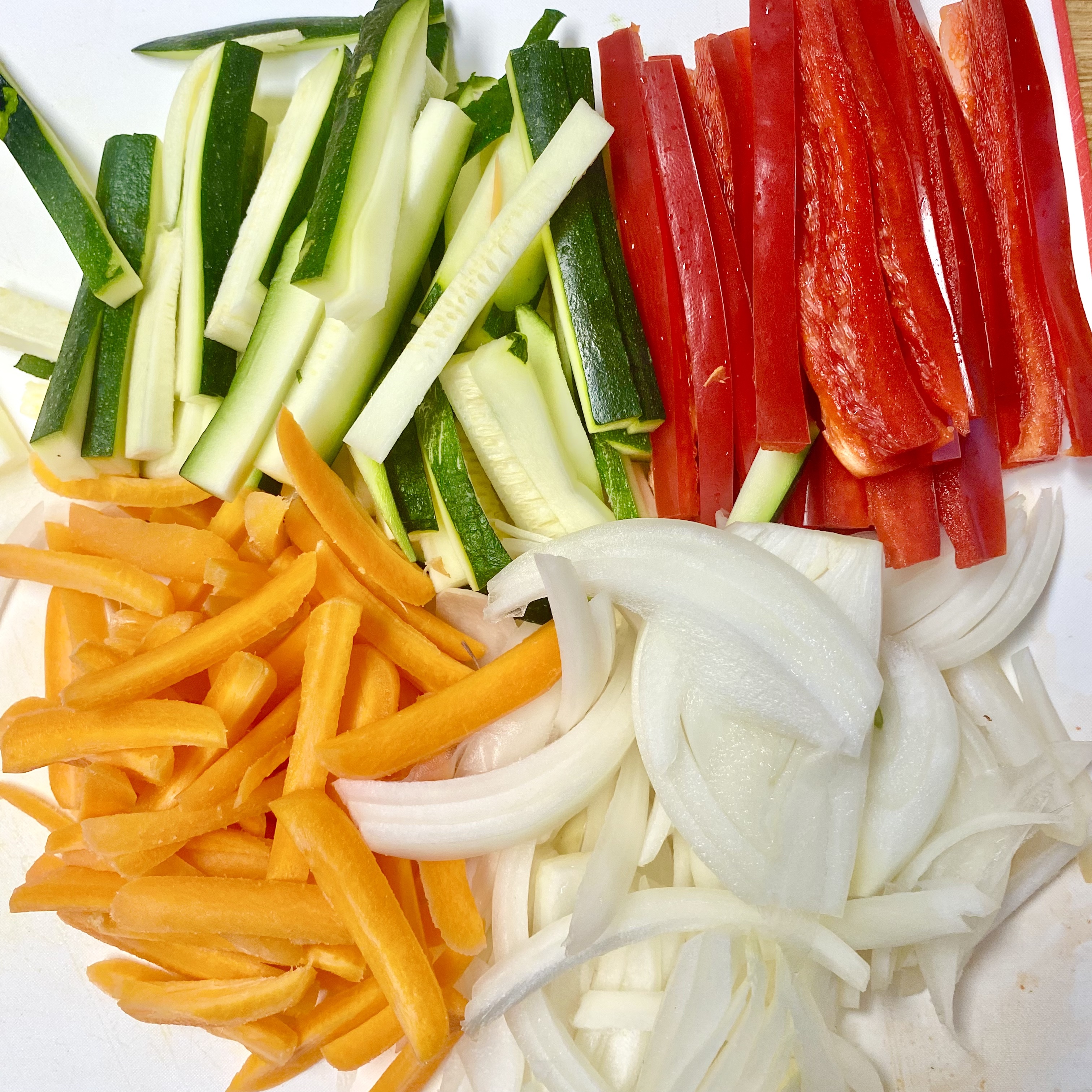
- Carrots, Zucchini, Red Bell Pepper, & Onion: The delicious veggies of this dish! I love the orange, green, and red that we get from these veggies. Together they add such a color pop to the plated pad thai! Additionally, each has its own health benefits including (and not limited to) the high Vitamin A content in carrots and the high Vitamin C content in bell peppers.
- Sesame Oil: Sesame oil is made from raw sesame seeds, and (you guessed it) toasted sesame oil is made from toasted sesame seeds. The resulting flavor (as expected) is a yummier and more intense flavor. I love that adding just a few teaspoons of this oil will bring sesame flavor to the entire dish! If you’ve never bought toasted sesame oil (or if you’re looking for a new one to try), here’s a link to Whole Food’s toasted sesame oil.

- Tofu: High protein, vegan, and vegetarian! This sometimes seemingly scary protein is actually SO easy and SO delicious.
- Soy Sauce: Our favorite type is the Kikkoman Lite Soy Sauce. This one seems to have better flavor and be more natural than some of the other ones!
- Garlic & Garlic Powder: In addition to adding great flavor, garlic has also been shown to reduce blood pressure and cholesterol in some people.
- Salt
- Chili Powder: Adds a little bit of spice! You can always add more chili powder if you’re wanting your pad thai to be spicier! You can also add in some red pepper flakes.
- Lime Juice: That delicious tanginess that is so characteristic of pad thai. Lime pairs beautifully with the dish. This recipe calls for lime juice in the peanut sauce, but feel free to add more on top!
- Peanut Butter - I HIGHLY recommend using an all-natural peanut butter that doesn’t have added sugars or oils (Adam’s 100% Natural Peanut Butter). All-natural peanut butters do tend to be more expensive, but they taste better, look more natural, and they’re so much better for your health! Peanut butter is a good source of protein and also contains healthy fats from the peanuts.
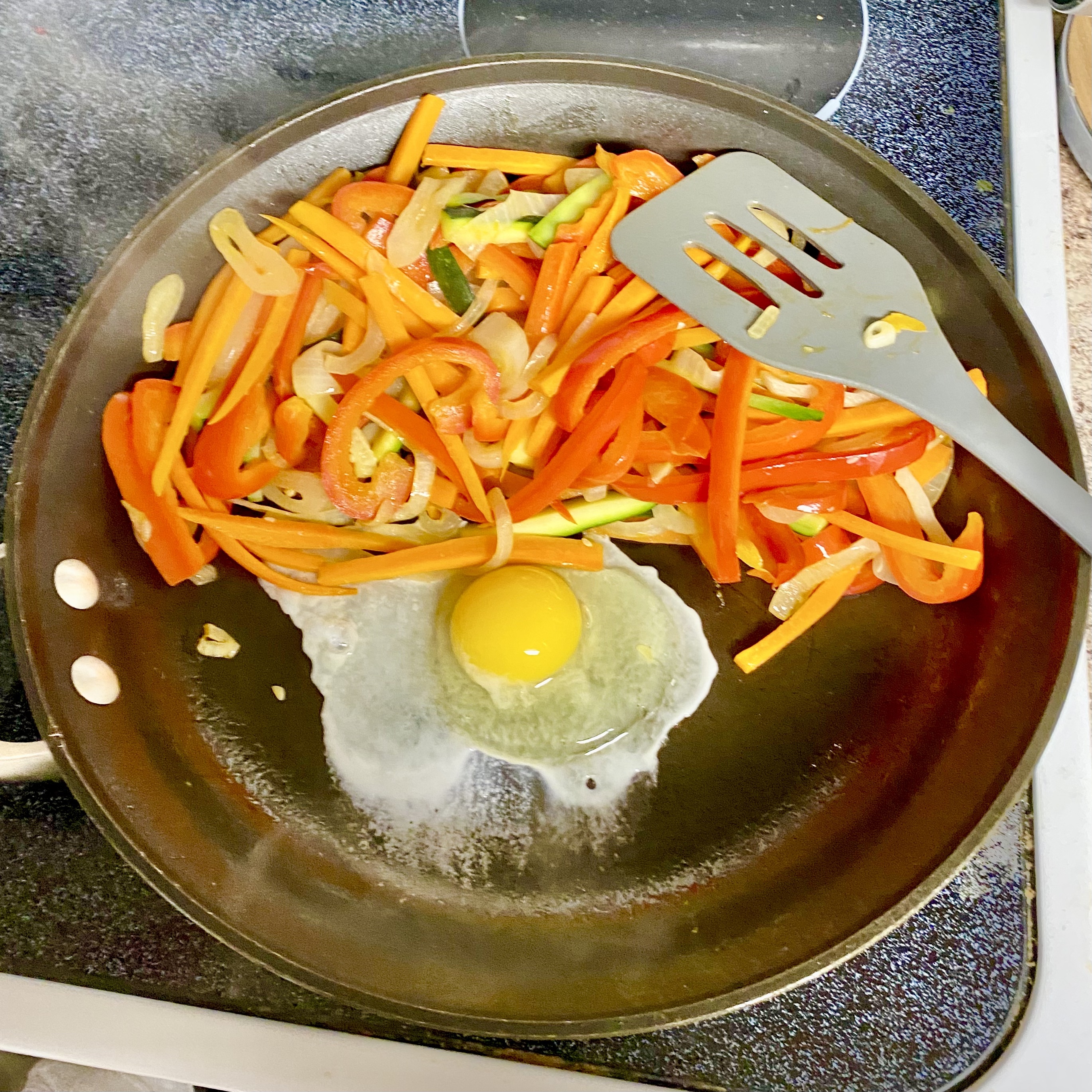
- Eggs: Eggs add additional protein and flavor to the dish. You may want to leave these out if you are trying to make a vegan dish.
HOW TO…
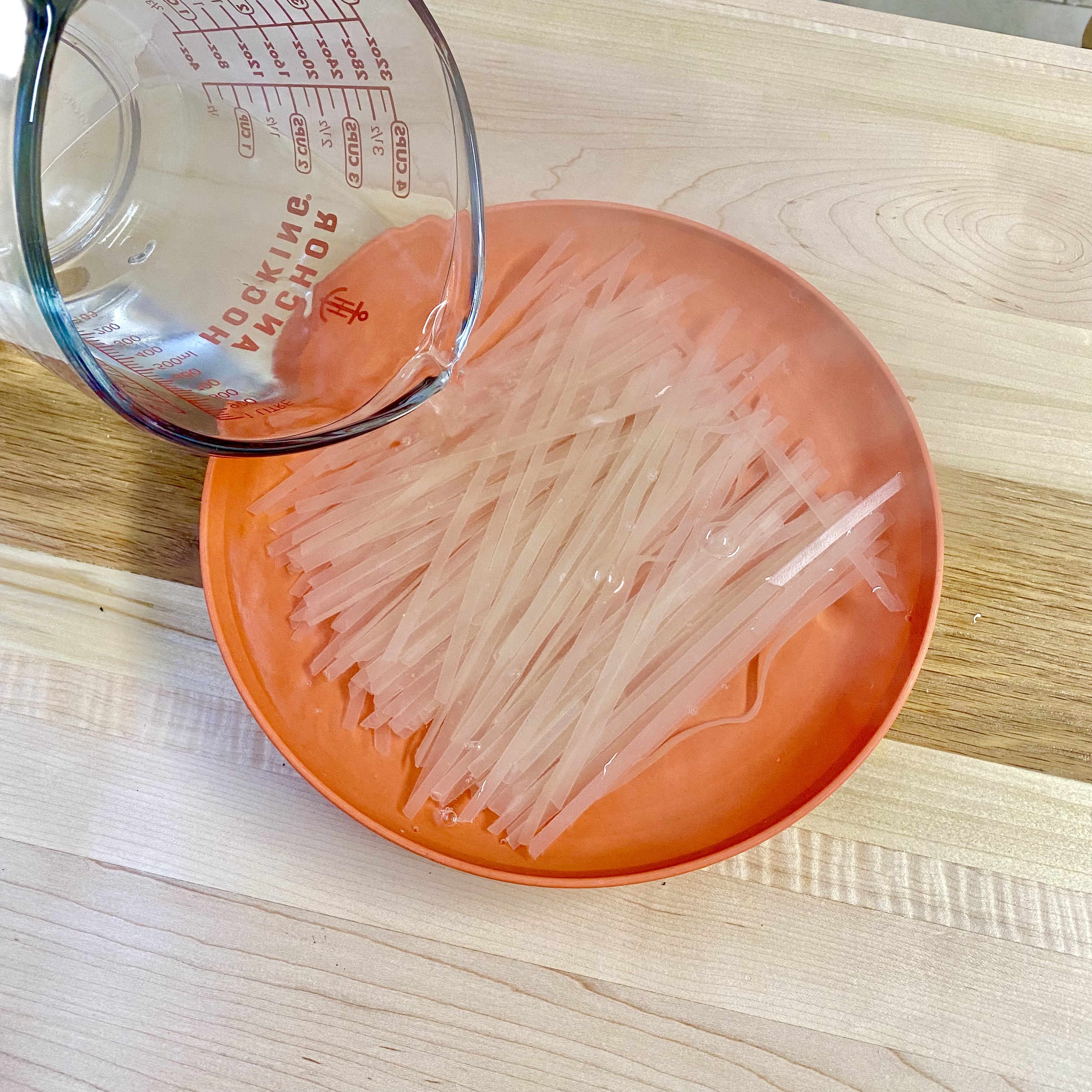
Begin by placing the rice noodles into a small, wide bowl. Pour boiling hot water over the noodles until they are completely submerged. Cover the bowl with a plate or lid to keep the steam in. Set aside and let the noodles soak for about 20 minutes.
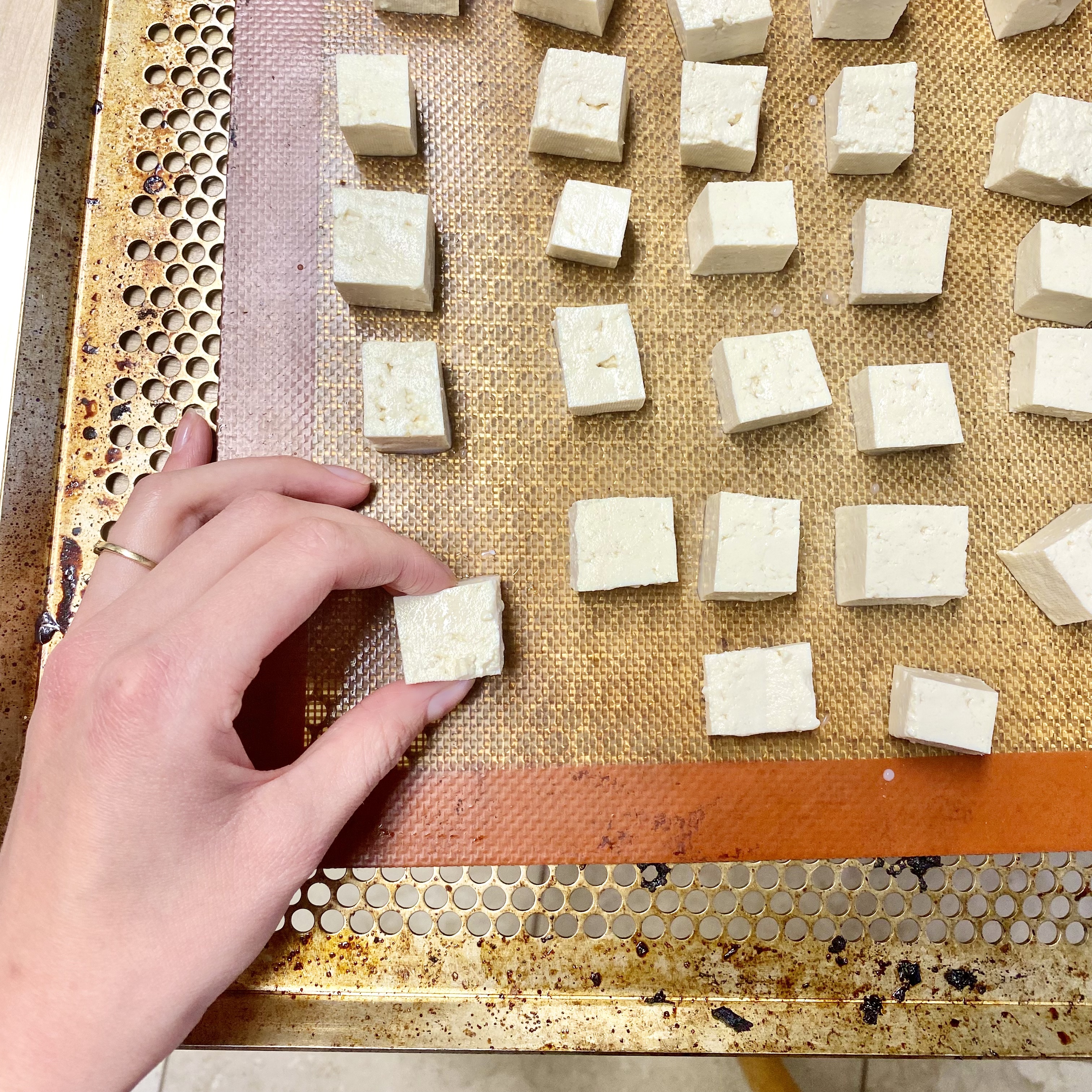
While the noodles begin to soak, begin cubing the tofu. I like to cut my tofu into about 1 x 1 x 1 inch cubes. You may want to do yours smaller, depending on your desired size of tofu. Place the cubes onto a cookie sheet that has been topped with a silicon baking mat. Sprinkle the tofu cubes with salt and soy sauce.

Roast the tofu cubes in the oven at 450 degrees F for about 10-15 minutes. You may want to flip the cubes half way through their cooking time for a more even roast. This isn’t necessary, however, and the tofu will still taste delicious if you choose not to flip the cubes mid-bake.
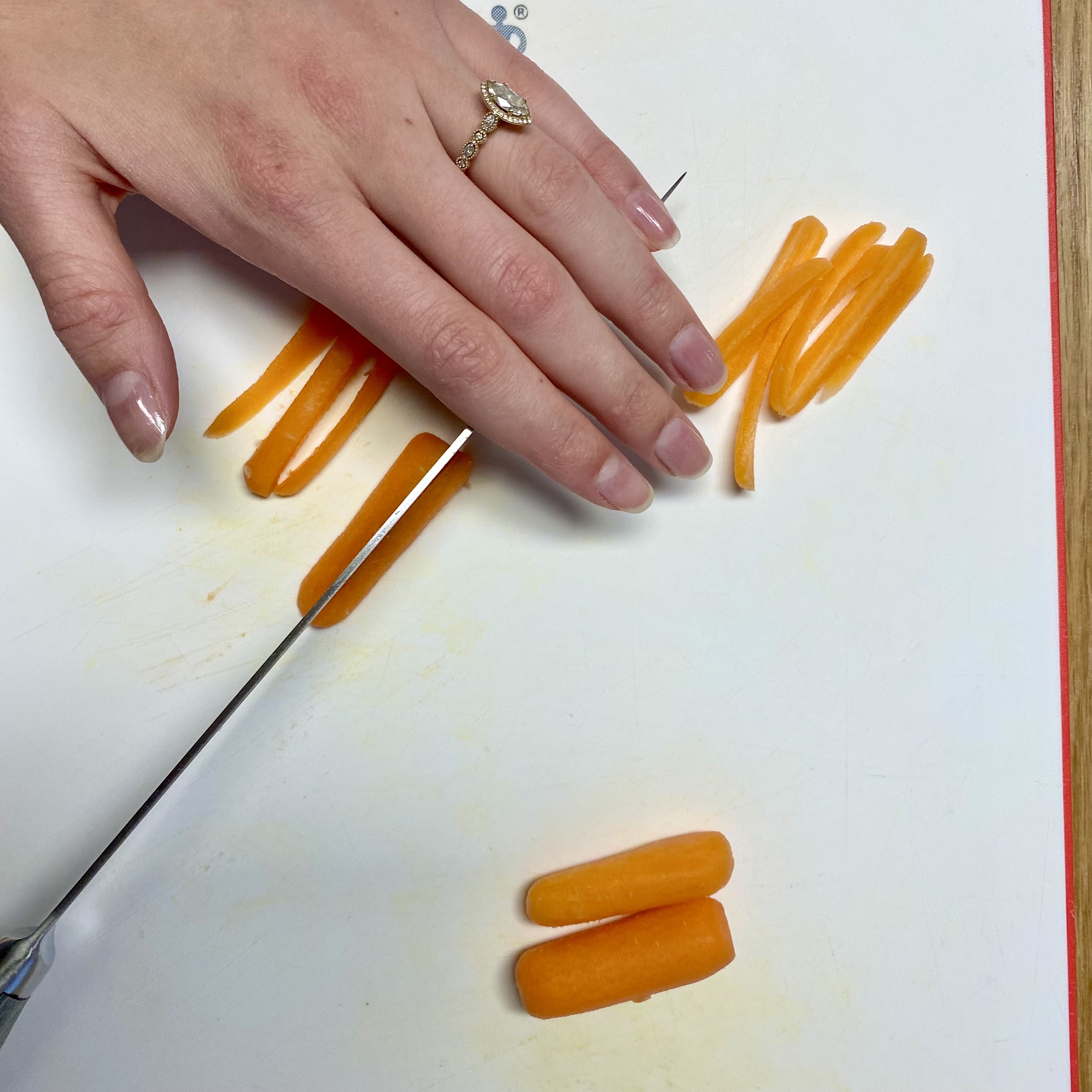
Meanwhile, begin peeling your carrots and coring the bell pepper. Be sure to wash each vegetable. Julienne the peeled carrots, zucchini, and red pepper. The julienne knife cut is a French culinary cut in which the food is cut into long, thin pieces. You’ll want to get all of the julienned vegetables to be similar sizes so the vegetables will cook on similar time frames.
Peel the onion and slice it into thin, half-moon sized cuts. This is best accomplished by cutting off both the top and bottom of the onion, and then slicing it in half from top to bottom. Take each half of the onion and place it face down on the cutting board. Proceed to slice so that you’ll end up with half-circle pieces of onion.
Once the veggies are prepared, begin to heat 2 teaspoons of sesame oil in a large skillet over medium heat. Once the oil is hot (you can test this with a drop or two of water), you can add in the veggies for a saute. Add a dash of salt to the veggies and saute for 7-10 minutes, or until the veggies are softened but still have a tiny bit of crunch to them.
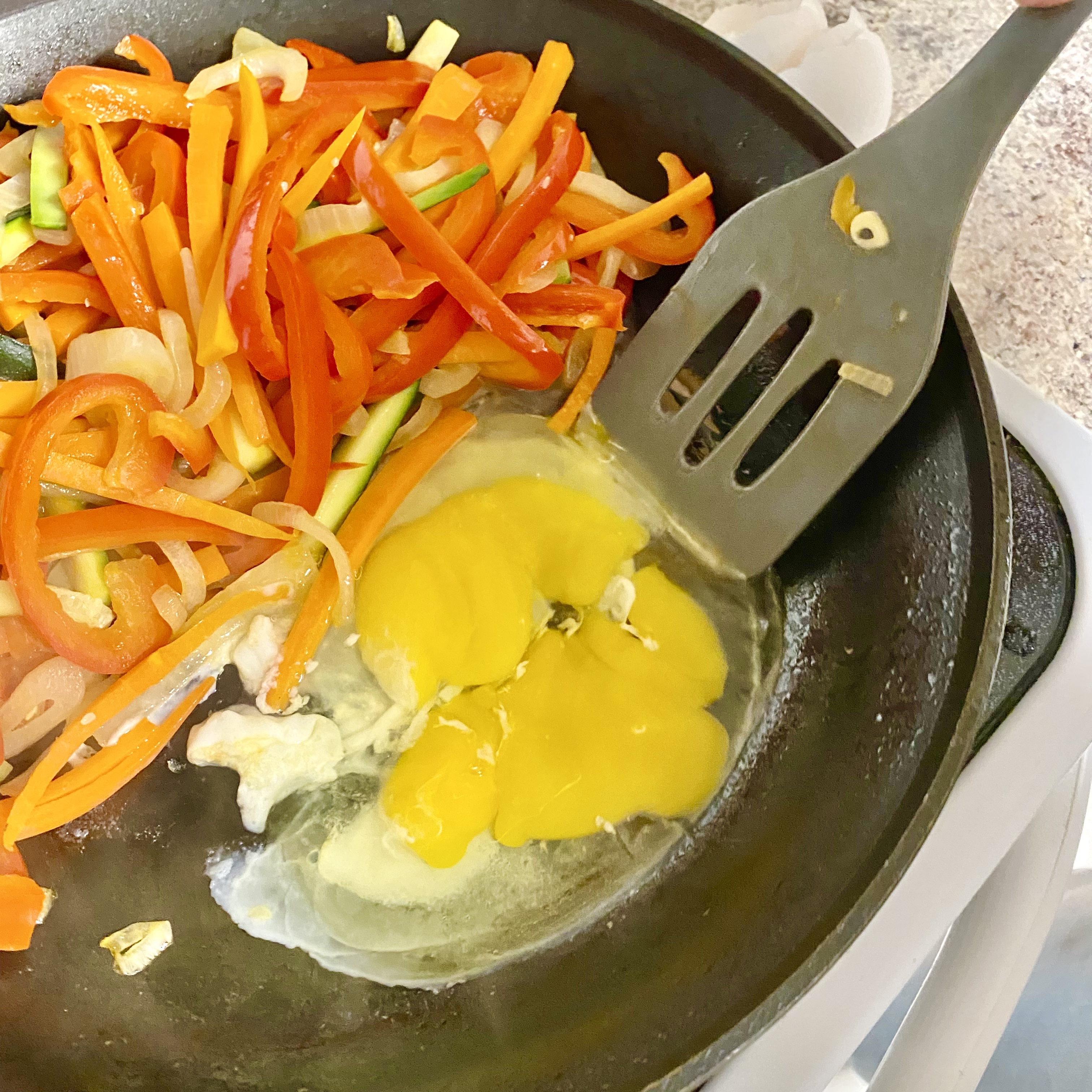
Move the veggies to one side of the pan so they are only taking up about half of the skillet. On the other half of the skillet, add 2 eggs. Break the yokes with a spatula and stir the eggs around so they can get a good scramble cook on them.
While the eggs are cooking, begin stirring together the peanut sauce. Be sure to keep an eye on the eggs so they don’t get overcooked.
Add in the salt, garlic powder, chili powder, lime juice, soy sauce, peanut butter, and water. Whisk together until no lumps remain. You may use creamy or chunky peanut butter for this sauce. They will taste the same, but chunky adds a bit more texture.
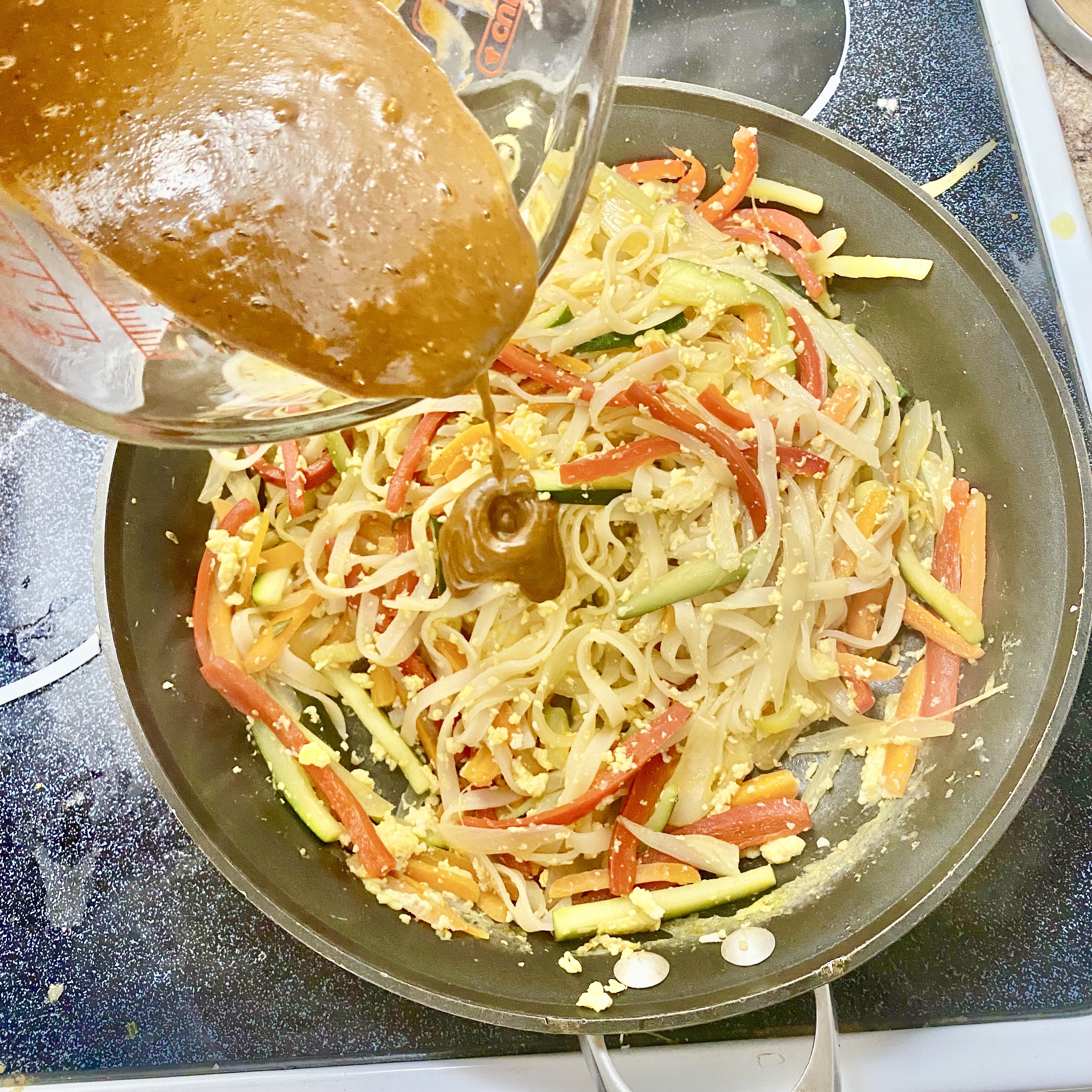
Once the eggs are cooked, you can mix them into the veggies. Add in the drained rice noodles and the peanut sauce to the skillet of eggs and veggies.

Once the peanut sauce, veggies, eggs, and rice noodles are combined, you can add in the cubes of tofu. Gently mix the tofu in and remove the skillet from the heat.
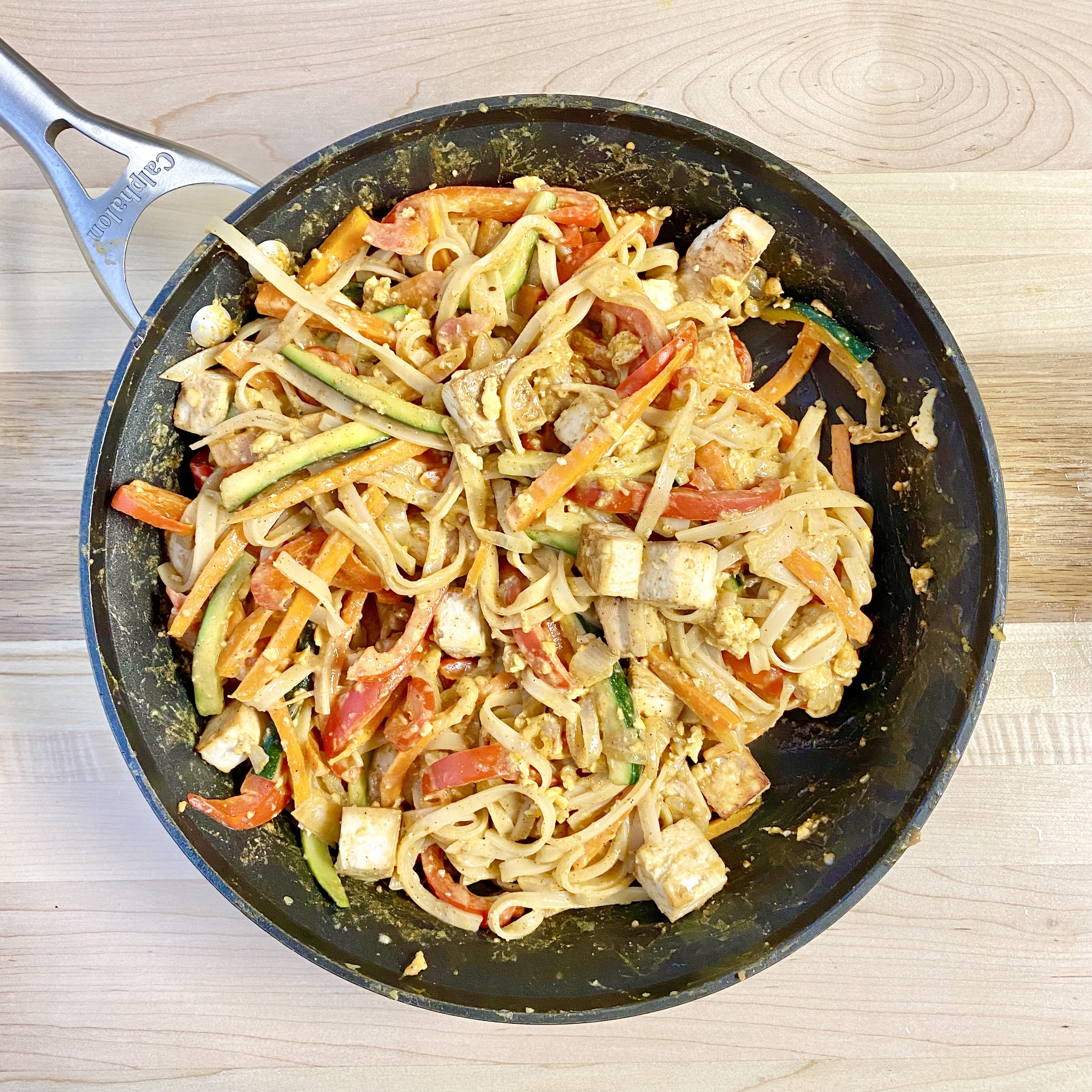
Top the finished pad thai with cilantro, roasted peanuts, lime, and broccoli sprouts.
Ingredients:
Rice Noodles
- 1 6 Oz. Package of Rice Noodles
- 2 Cup Water
Tofu
- 1 14 Oz. Brick of Tofu
- 1/8 Tsp Salt
- 11/2 Tbs Low Sodium Soy Sauce
Pad Thai
- 2 Carrots, Julienned
- 1 Bell Pepper, Julienned
- 1 Zucchini, Julienned
- 1/2 Onion, Diced
- 1 Dash Salt
- 2 Egg
Peanut Sauce
- 1/4 Tsp Salt
- 1/2 Tsp Garlic Powder
- 1 Tsp Chili Powder
- 1 Tbs Lime Juice
- 1/4 Cup Low Sodium Soy Sauce
- 1/3 Cup All Natural Peanut Butter
- 1/4 Cup Water
Directions:
Rice Noodles
- ADD RICE NOODLES TO BOWL
Place the rice noodles into a small, wide bowl. Pour boiling hot water over the noodles until they are completely submerged. - SOAK NOODLES
Cover the bowl with a plate or lid to keep the steam in. Set aside and let the noodles soak for about 20 minutes.
Tofu
- CUBE TOFU
Begin cubing the tofu. I like to cut my tofu into about 1 x 1 x 1 inch cubes. You may want to do yours smaller, depending on your desired size of tofu. - SEASON TOFU
Place the cubes onto a cookie sheet that has been topped with a silicon baking mat. Sprinkle the tofu cubes with salt and soy sauce. - COOK TOFU
Roast the tofu cubes in the oven at 450 degrees F for about 10-15 minutes.
Pad Thai
- JULIENNE VEGGIES
Peel the carrot and begin to julienne the carrots, pepper, and zucchini. Slice the onion into half-moon slivers. The julienne knife cut is a French culinary cut in which the food is cut into long, thin pieces. You’ll want to get all of the julienned vegetables to be similar sizes so the vegetables will cook on similar time frames. - SAUTE VEGGIES
Once the veggies are prepared, begin to heat 2 teaspoons of sesame oil in a large skillet over medium heat. Once the oil is hot (you can test this with a drop or two of water), you can add in the veggies for a saute. Add a dash of salt to the veggies and saute for 7-10 minutes, or until the veggies are softened but still have a tiny bit of crunch to them. - SCRAMBLE EGGS
Move the veggies to one side of the pan so they are only taking up about half of the skillet. On the other half of the skillet, add 2 eggs. Break the yokes with a spatula and stir the eggs around so they can get a good scramble cook on them. - ADD RICE NOODLES
Add the cooked rice noodles to the egg and veggie mixture.
Peanut Sauce
- MIX INGREDIENTS
Add the salt, garlic powder, chili powder, lime juice, soy sauce, peanut butter, and water to a medium-sized bowl / liquid measuring cup. Whisk together until no lumps remain. - ADD TO PAD THAI
Add the peanut sauce to the pad thai mixture with the eggs, rice noddles, and veggies. - STIR IN TOFU
Once the peanut sauce is well combined into the pad thai mixture, gently stir in the tofu and remove from the heat. - TOP & SERVE
Top the finished pad thai with roasted peanuts, cilantro, lime, green onions, and broccoli sprouts. ENJOY!
Nutrition Facts
Serving Size 2 Cups of Pad Thai
Serving Per Container 5
| Amount Per Serving | ||
|---|---|---|
| Calories 319 | ||
| % Daily Value* | ||
| Total Fat 18g | 23% | |
| Saturated Fat 3g | 15% | |
| Trans Fat 0g | ||
| Cholesterol 75mg | 25% | |
| Sodium 863mg | 37% | |
| Total Carbohydrate 23g | 8% | |
| Dietary Fiber 6g | 21% | |
| Sugars 4g | 8% | |
| Protein 22g | 44% | |
Leave a comment:
0 Comments:
Hello! We are the McMillans and we are passionate about food! We love creating bites worth taking and sharing our recipes. We hope you can find some recipes you like here today!